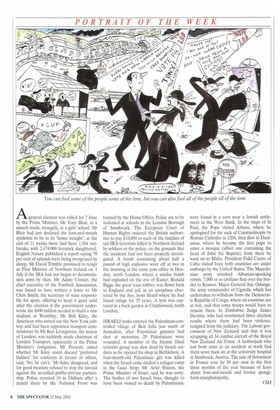PORTRAIT OF THE WEEK
Ageneral election was called for 7 June by the Prime Minister, Mr Tony Blair, in a speech made, strangely, in a girls' school. Mr Blair had just declared the foot-and-mouth epidemic to be in its 'home straight'; at the end of 11 weeks there had been 1,564 outbreaks, with 2,474,000 livestock slaughtered. English Nature published a report saying 70 per cent of uplands were being overgrazed by sheep. Mr David Trimble promised to resign as First Minister of Northern Ireland on 1 July if the IRA had not begun to decommission arms by then. Mr Adam Crozier, the chief executive of the Football Association, was found to have written a letter to Mr Chris Smith, the secretary of state responsible for sport, offering to keep it quiet until after the election if the government underwrote the .€600 million needed to build a new stadium at Wembley. Mr Bob Kiley, the American who sorted out the New York subway and had been appointed transport commissioner by Mr Ken Livingstone, the mayor of London, was suddenly made chairman of London Transport, apparently at the Prime Minister's instigation. Mr Prescott, asked whether Mr Kiley could discard 'preferred bidders' for contracts in favour of others, said, 'No, he can't.' Mr Kiley disagreed, and for good measure refused to stop the lawsuit against the so-called public—private partnership. Police arrested 16 in Oldham after a march there by the National Front was banned by the Home Office. Police are to be stationed at schools in the London Borough of Southwark. The European Court of Human Rights ordered the British authorities to pay £10,000 to each of the families of ten IRA terrorists killed in Northern Ireland by soldiers or the police, on the grounds that the incidents had not been properly investigated. A bomb containing about half a pound of high explosive went off at two in the morning at the same post office in Hendon, north London. where a similar bomb had exploded on the eve of Easter. Ronald Biggs, the great train robber, was flown back to England and jail, in an aeroplane chartered by the Sun, from Brazil where he had found refuge for 35 years. A lynx was captured in a back garden in Cricldewood, north London.
ISRAELI tanks entered the Palestinian-controlled village of Beit Jalla just south of Jerusalem, after Palestinian gunmen had shot at motorists; 20 Palestinians were wounded. A member of the Islamic Jihad terrorist group was shot dead by Israeli soldiers as he opened his shop in Bethlehem. A four-month-old Palestinian girl was killed when the Israeli army shelled a refugee camp in the Gaza Strip; Mr Mel Sharon, the Prime Minister of Israel, said he was sorry. The bodies of two Israeli boys, thought to have been stoned to death by Palestinians, were found in a cave near a Jewish settlement in the West Bank. In the steps of St Paul, the Pope visited Athens, where he apologised for the sack of Constantinople by Roman Catholics in 1204, then flew to Damascus, where he became the first pope to enter a mosque (albeit one containing the head of John the Baptist); from there he went on to Malta. President Fidel Castro of Cuba visited Iran; both countries are under embargo by the United States. The Macedonian army attacked Albanian-speaking rebels; 7,000 or so civilians fled over the border to Kosovo. Major General Jeje Odongo, the army commander of Uganda, which has undertaken to withdraw from the Democratic Republic of Congo, where six countries are at war, said that some troops would have to remain there. In Zimbabwe Judge James Devittie, who had overturned three election results where there had been violence, resigned from the judiciary. The Labour government of New Zealand said that it was scrapping all 34 combat aircraft of the Royal New Zealand Air Force. A lumberjack who lost both arms in an accident at work had them sewn back on at the university hospital in Innsbruck, Austria. The sale of horsenaeat in France rose by 30 per cent in the first three months of the year because of fears about foot-and-mouth and bovine spongiform encephalopathy.
CSH


































































 Previous page
Previous page